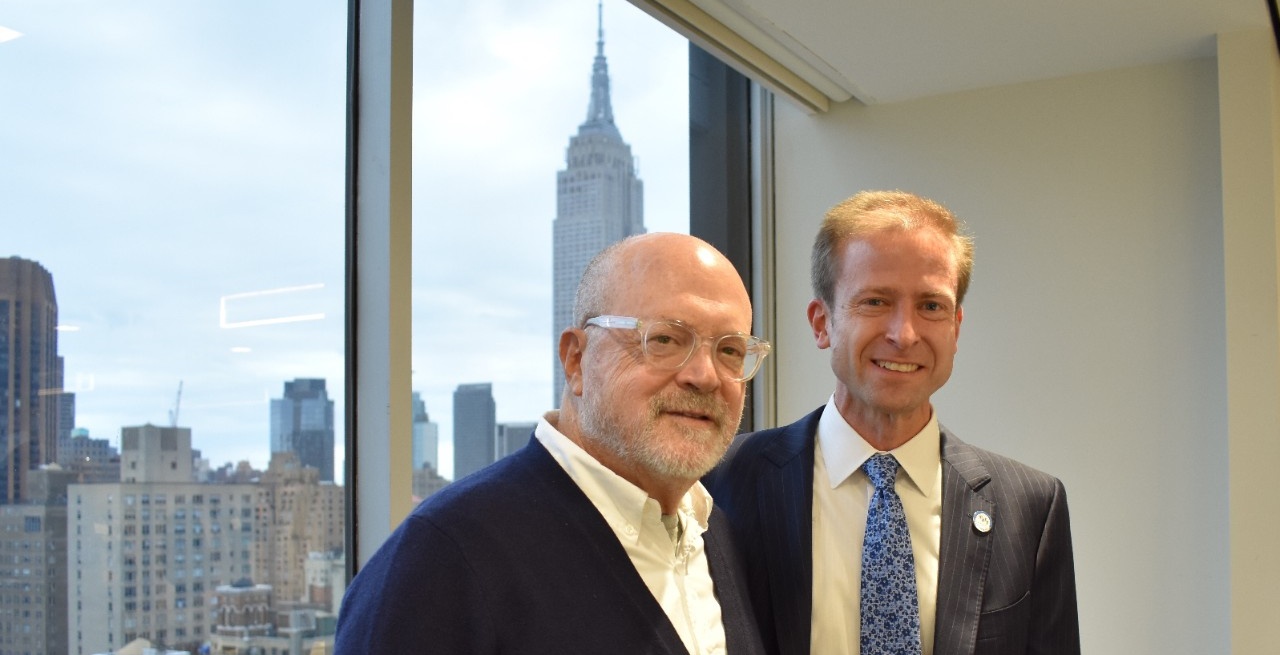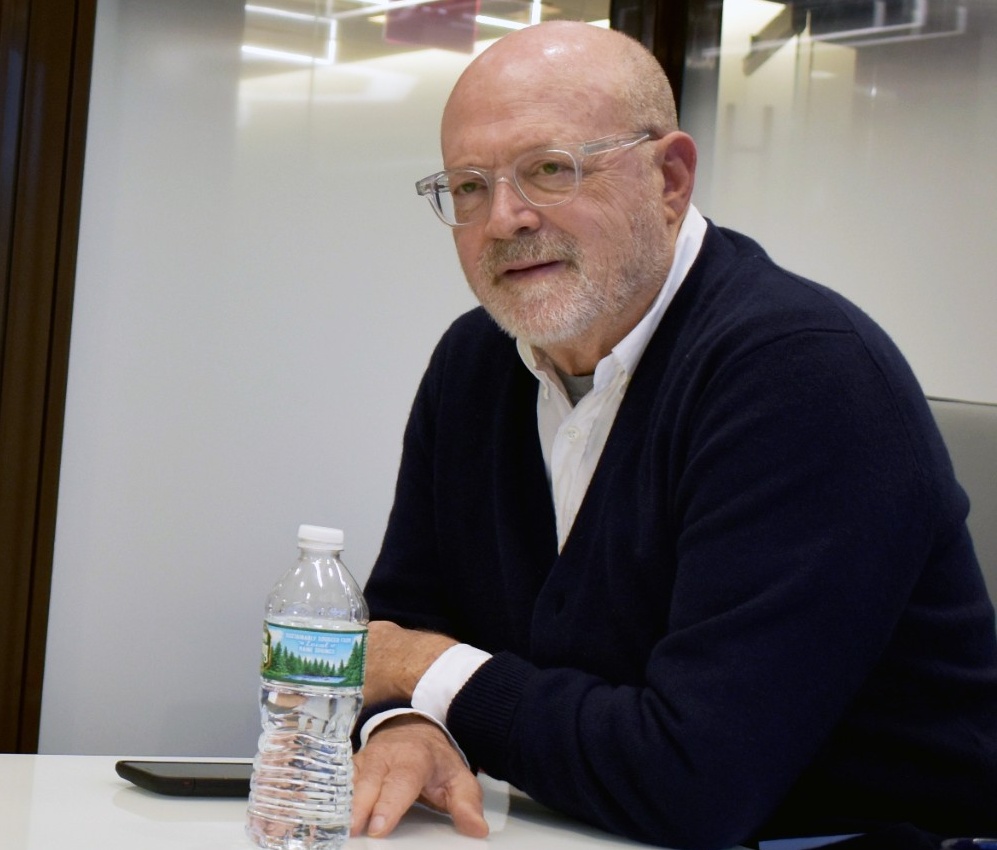The Merchant Prince
A conversation with J. Crew chairman Mickey Drexler, BS ’66
By Matthew Biddle

Mickey Drexler, BS ’66, with Paul Tesluk, dean of the University at Buffalo School of Management. Photo: Matthew Biddle
“Do you have my shopping mall?” retail legend Mickey Drexler, BS ’66, asks his assistant.
She hands Drexler his iPhone.
“This is the shopping mall today — you carry it around and can check any price in the world on any product you want.”
During his 40-year retail career, Drexler has turned around three major fashion brands and helped launch several others, including Old Navy, GapKids and Madewell. After revitalizing Ann Taylor in the 1980s, Drexler was named CEO of the Gap and, over the next 18 years, transformed the business — and the way Americans dress. He slashed its product lines down to a single Gap brand, redesigned stores, focused on quality and chic styles, and took the company from $480 million in annual revenue to nearly $14 billion.
In 2003, Drexler joined J. Crew as CEO and grew the company into a global brand famously worn by First Lady Michelle Obama and other trendsetters. Drexler stepped down as CEO last year, but remains chairman with 10 percent company ownership. He also serves as chairman of activewear brand Outdoor Voices and invests in companies he loves through his firm, Drexler Ventures.
All of his experiences were fair game last fall during a wide-ranging conversation with Drexler and members of the School of Management Dean’s Advisory Council.

Mickey Drexler, BS ’66, spoke to members of the Dean's Advisory Council last fall. Photo: Matthew Biddle
Finding his first job
“It’s funny how these turning points in your life make a difference. I had a summer job at Abraham & Straus during MBA school and interviewed for a job at Bloomingdale’s. A&S offered me $10,500 to start, and my friend was offered $11,000. I was furious because they knew me. I had worked there for three months. Most people don’t pay attention to what a 23-year-old is thinking, but you realize intuitively that it says something about an organization when they treat you like that. Then, Bloomingdale’s offered me $11,000, and thank God because it made a huge difference in my career.”
Retail today
“The apparel industry — and the world of retail — is on its side right now. The business will never be the same again. And it’s not just Amazon — it’s the whole environment. Discounting is rampant, online shopping has created enormous difficulty in the industry, and I don’t think people care as much about clothes anymore — they care about value.”
The future of retail
“I don’t think it’s going in a good direction. There are so many signals that tell you that — empty stores in every city in America. The commodity business is going to be a delivered-to-your-doorstep business. Someone said recently in a meeting, ‘In five years, they say the online business will be 30 percent [of retail sales]; right now, it’s 15 percent.’ To me, it’s going to be 50 percent. Whether it’s two years or five years, I don’t think any of us know, but the fact of the matter is, it’s going that way.”
How brands can stay relevant
“Creativity is not just knowing how to design a garment. It’s being creative in finance and technology. In any business, it’s about being innovative and creative, following the consumer where he or she is going, figuring out where the puck is going and seeing around corners. That’s critical.”
Managing and communicating with employees
“I used a loud speaker in my office [at J. Crew.] Every thought I had, I dialed a number and 1,200 employees in our buildings in New York City and Long Island City heard what was on my mind. It was a tremendous training tool.
I am a micromanager. If a micromanager is someone who makes sure every customer is taken care of, I’m a micromanager. I do it because I care. As a CEO, I want people in every department who come to work every day and feel they own it and if it doesn’t work, it’s their fault. The best people in any company are those who feel that responsibility.
In fact, I tested Outdoor Voices the other day. I sent a complaint email with a question to see how quick our customer experience department was, and they answered with a really great answer in two hours. I wish more people micromanaged. Steve Jobs micromanaged the hell out of every product.”
Finding the right team
“Hiring is the most difficult thing in the world to figure out. If you’re 10 for 10, you’re probably not taking the appropriate risks. But if you can hire six or seven out of 10, and get the future leaders of your company out of that seven, you’re doing better than most companies.
I will never hire anyone I won’t learn from. I interview most people and have throughout my career. When I’m interviewing someone, I want to learn from them and don’t want them to necessarily have to learn from me. Today, we make it easy for people to get jobs because they look the right way, they interview the right way. But I love people who are nervous during interviews — it tells you a lot about someone and shows their real drive and ambition.”
Emotional intelligence
“It’s huge. It’s much more important than any grade you get in school. Give me a street-smart kid. That’s what I like about adversity — you grow up on the streets, you fend for yourself and you get it. Emotional intelligence is key, along with drive, ambition and a certain amount of insecurity.”